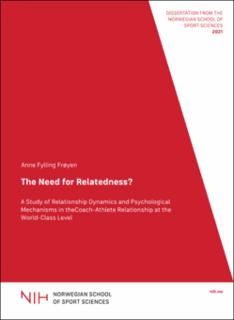| dc.contributor.author | Frøyen, Anne Fylling | |
| dc.date.accessioned | 2021-04-28T10:38:39Z | |
| dc.date.available | 2021-04-28T10:38:39Z | |
| dc.date.issued | 2021 | |
| dc.identifier.isbn | 978-82-502-0590-1 | |
| dc.identifier.uri | https://hdl.handle.net/11250/2740134 | |
| dc.description | Avhandling (doktorgrad) - Norges idrettshøgskole, 2021 | en_US |
| dc.description.abstract | Introduction: Achieving continuous success in the highly demanding context of world-class sport is a prerogative of very few athletes and coaches (Lara-Bercial & Mallett, 2016). Coaches, as well as athletes, play essential roles in this context, and the quality of their relationship is understood as one of the key factors for success (Jowett, 2017; Jowett & Cockerill, 2003). With the quality of the coach-athlete relationship being a key factor for success, it makes it important to gain more in-depth knowledge and understanding of the ongoing and dense dynamics in such relationships at this level.
Aim: The main aim of this thesis was to gain in-depth and detailed knowledge about the relationship dynamics and the psychological mechanisms operating within the coachathlete relationship at the world-class level, perceived from the perspective of both coaches and athletes.
The Studies: This thesis comprises five studies. All the data were collected with the use of semi-structured interviews. The first two studies investigated antecedents of need satisfaction of basic psychological needs of athletes (n=6) and coaches (n=4) in relation to each other. In the third study, we explored the meaning of the coach-athlete relationship for two male super-elite athletes. In the fourth study, we investigated the interpersonal knowledge of two serial-winning coaches and how they used this expertise to build a collaborative partnership with their athletes. In the fifth study, we sought to get detailed insight into the use of communication, its meaning and purpose in two coach-athlete dyads.
Main Results: In the first study, to be seen as a “whole person” and acknowledged in the planning and execution of training represented antecedents of satisfaction of autonomy among athletes. Further, help to improve skills and feeling supported as an athlete was important antecedents for the need satisfaction of competence and relatedness for the athletes. For the coaches in study 2, feedback on the quality of their work was an antecedent of need satisfaction of competence. Information about their athletes' life situation and insight into their thoughts and feelings in different competitive situations provided them with a sense of security. It thus represented antecedents of need satisfaction of relatedness. Potential antecedents of need thwarting for both athletes and coaches were also illuminated. Study 3 provided us with insight into the relational consequences of the coach being perceived as a stressor and potential disturbance to performance, and how super-elite athletes can use their accumulated power to distance themselves from their coach. The main findings in study 4 were that the basic premise for the coaches' interaction with the athletes was a recognition that their perception of a situation did not necessarily represent the only reality or correct answer. Further, building high-quality coach-athlete relationships was, in many ways, a buffer for unnecessary risk-taking and disruptions in a context marked by uncertainty. In study 5, the findings revealed that both dyads perceived the quality of their communication process as essential for building and sustaining relationship quality. They also perceived the quality of their communication as a crucial performance-enhancing factor, and thus they explicitly trained on their communication to be optimally prepared in competitions.
Conclusion: In summary, the findings from the present thesis highlight the complexity of the relationship dynamics and psychological mechanisms underpinning these dynamics. Several theoretical frameworks and concepts provided useful perspectives to explain and discuss our findings, and hence, contributed with valuable viewpoints on what goes on within the coach-athlete relationship at the world-class level in sport, and its significance for both relationship quality and performance. | en_US |
| dc.language.iso | eng | en_US |
| dc.relation.haspart | Paper I: Frøyen, A. F., Pensgaard, A. M. (2014). Antecedents of need fulfilment among elite athletes and coaches. A qualitative approach. International Journal of Applied Sports Sciences, 26(1), 26-41. | |
| dc.relation.haspart | Paper II: Frøyen, A. F., Pensgaard, A. M., & Gustafsson, H. (2020). «You can be my coach, but I am the one in charge» An interpretative phenomenological analysis of the importance of the coach-athlete relationship in Norwegian super-elite athletes. International Journal of Applied Sports Sciences, 32(1), 49-68. | |
| dc.relation.haspart | Paper III: Frøyen, A. F., Pensgaard, A. M., & Gustafsson, H. Making athletes feel safe and secure: An IPA of two serial winning coaches. (manuscript). | |
| dc.relation.haspart | Paper IV: Frøyen, A. F., Pensgaard, A. M., & Gustafsson, H. The art of communication: An in-depth study of a serial winning coach and two world-class athletes. (manuscript). | |
| dc.subject | nih | en_US |
| dc.subject | doktoravhandlinger | en_US |
| dc.title | The Need for Relatedness?: A Study of Relationship Dynamics and Psychological Mechanisms in theCoach-Athlete Relationship at the World-Class Level | en_US |
| dc.type | Doctoral thesis | en_US |
| dc.description.version | publishedVersion | en_US |
| dc.description.localcode | Institutt for idrett og samfunnsvitenskap / Department of Sport and Social Sciences | en_US |
